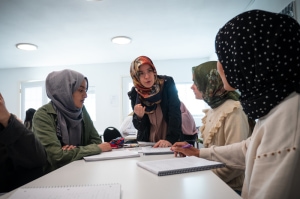Arabic Assessment Guide for International Applicants
How to Prepare for the Arabic Proficiency Test
REQUIREMENT
Due to regulations governing the F-1 student visa, international students are unable to join us for the Summer Arabic Intensive Program. Therefore, international students must first pass the Arabic Proficiency Test in order to receive an offer of admission. After evaluating your application, the Admissions Office may invite you to take the test covering material equivalent to the first twelve chapters of Al-Kitaab Fii Ta'allum al-'Arabiyya: A Textbook for Beginning Arabic, Part 1, 2nd Edition.
WHAT THE PROFICIENCY TEST WILL COVER
The Arabic Proficiency Test is comprised of one oral and one written exam.
For the oral exam, students will meet with an instructor online to answer Arabic grammar questions using vocabulary and expressions based on chapters 1–12 of Al-Kitaab (see below). Short, pre-prepared oral speeches will be delivered from memory on topics pertaining to personal life, family, and past or future events.
The written exam is comprised of the following sections, with an emphasis on the vocabulary and grammar learned in chapters 1–12 of Al-Kitaab:
-
Proper orthography (khatt)
-
Fill-in-the-blank and multiple-choice questions
-
Phrase and sentence identification (e.g., jumlah ismiyyah/fi‘liyyah, ism wa sifah, idafah)
-
Reading comprehension
-
Root (jadhr) and form (wazn) identification
-
Verb conjugations (tasrif al-af‘al)
-
Writing composition (insha’) on a past or future event
GRAMMAR TOPICS COVERED IN AL-KITAAB
The following list identifies grammar topics presented within chapters 1–12 of Al-Kitaab:
-
Chapter 1: Arabic names, gender (al-mudhakkar wa al-mu’annath), nisbah adjectives, interrogatives (adawat al-istifham)
-
Chapter 2: Subject pronouns (al-dama’ir), common singulars and plurals (al-mufrad wa al-jam‘), the nominal sentence (al-jumlah al-ismiyyah)
-
Chapter 3: Family tree (shajarat al-‘a’ilah), the idafah construct, possessive pronouns (dama’ir milkiyyah)
-
Chapter 4: The imperfect mood (al-fi‘l al-mudari‘), verb negation (al-nafy), the verbal sentence (al-jumlah al-fi’liyyah)
-
Chapter 5: Adverbs, noun-adjective phrases (ism wa sifah), demonstrative pronouns (ism al-isharah)
-
Chapter 6: Al-Masdar, asking why (li-madha?) and explaining the cause
-
Chapter 7: Expression possession with li-/‘inda/ma‘a, fronted predicates (khabar muqaddam), the verb kana, “How much?” (Kam?)
-
Chapter 8: The perfect mood (al-fi‘l al-madi), negating the past tense verb (nafy al-madi), learning the forms (al-madi, al-mudari‘, al-masdar), roots and forms (al-jadhr wa al-wazn), the Arabic dictionary (al-qamus al-‘arabi), numbers 11–100 (al-‘adad)
-
Chapter 9: Laysa, ordinal numbers (al-a‘dad al-tartibiyyah), telling time (kam al-sa‘ah?)
-
Chapter 10: The subjunctive mood (al-mudari‘ al-mansub), prepositions and pronouns, object pronouns (dama’ir al-nasb)
-
Chapter 11: The imperfect mood (al-mudari‘ al-marfu‘), the adjectival sentence (jumlah al-sifah), quantifiers (kull, ba‘d, mu‘zam, iddat)
-
Chapter 12: Superlatives (ism al-tafdil), the future (al-mustaqbal), negating the future (nafy al-mustaqbal), subject-verb agreement within verbal sentences
PREPARING FOR THE ARABIC PROFICIENCY TEST
To prepare for the Arabic Proficiency Test, we recommend one of the following options:
1. Study at an accredited institution. You may consider enrolling in online courses at Qasid Arabic Institute (based in Amman, Jordan)
2. Study with a tutor. We recommend you study with a qualified instructor proficient in Modern Standard Arabic (al-‘Arabiyyah al-fusha)
3. Study independently. If you have prior training in Arabic grammar, then you may consider independent study based on Al-Kitaab. If you have no prior training in Arabic grammar, we do not recommend that you attempt to prepare for the Arabic Proficiency Test on your own.



